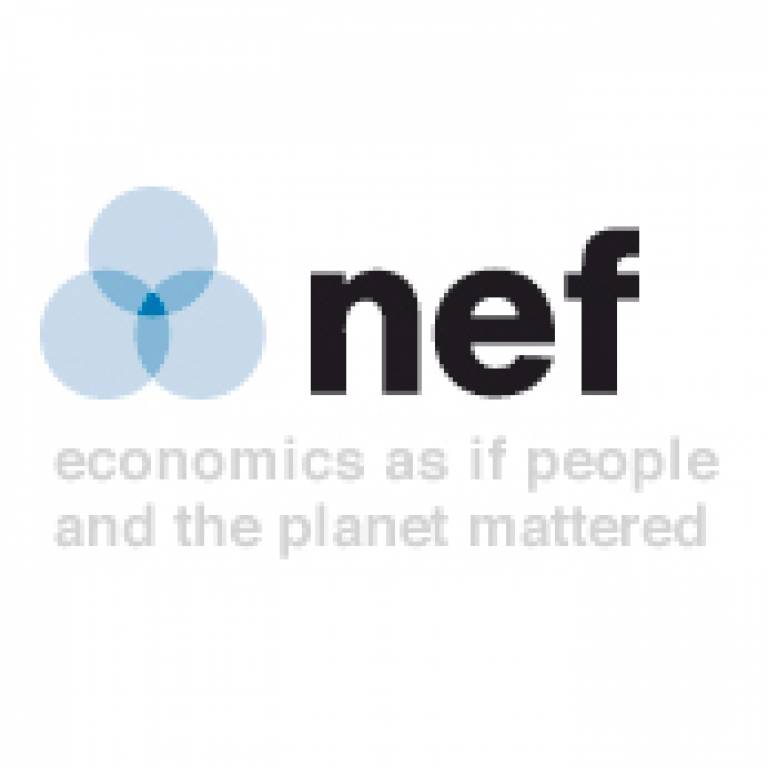New Economics Foundation lecture: The Great Transition
4 December 2009
Links
 ucl.ac.uk/environment-institute/" target="_self">UCL Environment Institute
ucl.ac.uk/environment-institute/" target="_self">UCL Environment Institute
Andrew Simms, Director of the New Economics Foundation (NEF) and UCL Geography alumnus, spoke at the UCL Environment Institute on 1 December.
In his introduction, Professor Mark Maslin (Director of the UCL Environment Institute), noted Mr Simms' authorship of NEF's 2008 report The Green New Deal, which had been taken up in policy discussions by the United Nations Environment Programme and President Obama.
Mr Simms spoke on the topic 'The Great Transition: How we get from here to there', based on the NEF's latest report of the same name. The report aims to provide a blueprint for building a post-global recession economy based on stability, sustainability and equality, and argues the case for creating a new kind of economy that is essential if governments are going to tackle climate change while avoiding the mounting social problems associated with the rise of economic inequality.
Mr Simms spoke of politicians' and economists' determination and commitment to rescue collapsed banks, on the basis that no price was too great for governments to rescue major financial institutions. What about the biosphere, he asked, was that not also in the strategic category of 'too big to fail?'
The UK has spent 20% of its GDP in support of the financial sector, he noted, but nature does not do bail-outs. The UK compares poorly with several other developed economies in terms of the share of national spend committed to green measures, at 7%, against the US (12%), Germany (13%), and Korea (80%), with an international average of 15%.
The world needs a new economic model, Mr Simms observed, that recognises that a resumption of global economic growth along its pre-recession trajectory is not ecologically sustainable - we would need an additional 2.4 planets in order to avoid going into ecological debt in the coming decades. Mr Simms commended the work of Professor Herman Daly, an ecological economist at the School of Public Policy, University of Maryland, who has argued the case for an economics of maintenance, of 'better, not bigger.'
A key issue, noted Mr Simms, is the problem of 'lock-in,' whereby economic pricing mechanisms fail to factor in environmental costs. He cited interest rate systems, the fiduciary duty of company boards to maximise capital growth for their shareholders, and national physical infrastructures, including large centralised power generation, as significant constraints. But the biggest lock-in of all, he suggested, was cultural - the social norm that first and foremost people are viewed as consumers rather than citizens.
Citing James Hansen, Head of the NASA Goddard Institute for Space Sciences, Mr Simms said that the Earth was on the cusp of losing the climatic conditions under which human civilisation had developed. He also noted UK Prime Minister Gordon Brown's statement in advance of next week's climate change summit in Copenhagen, that "This is not a time for outdated thinking, but for fresh and innovative thinking that gets to the hear of the problem." He ended his lecture with the words of Winston Churchill: "It is not enough to say that we are doing our best. We need to do what is necessary."
A vigorous question and answer session followed, addressing green GDP, the [in]capacity of the UK's mainstream political parties truly to get to grips with the nexus of climate change and economics, and the issue of cultural lock-in. On the latter, Mr Simms noted the popularity in the UK of looking back to the frugality and common purpose experienced in World War II, and contemporary demands for reconnection to authenticity. He commended Ration Me Up, the carbon ration book issued by the Ministry of Trying To Do Something About It, created by the New Economics Foundation.
By Ian Scott, Facilitator, UCL Grand Challenges
UCL context
UCL & Climate Change is a website produced by UCL Communications to showcase the breadth of expertise at UCL being brought to bear on the issue of climate change in the run-up to COP15.
Related news
Tony Juniper at UCL: The public reaction to the environmental crisis
 Close
Close

